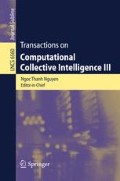Abstract
One of the possible solutions to ensure software quality is to involve users in its development and gradual improvement. In the described approach users provide regular feedback on the considered expert system in a survey by questionnaire. In the presented paper there are given guidelines on how to design and conduct such survey. The devised quality tree reflects the users’ point of view. Specifications formulated on the basis of the feedback allow software designers to develop improved versions of the considered intelligent system. The reported empirical research refers to an expert system applied in civil engineering. After six iterations of its assessment and then its related improvements the level of users’ satisfaction from the product is currently much better than that at the beginning.
Access this chapter
Tax calculation will be finalised at checkout
Purchases are for personal use only
Preview
Unable to display preview. Download preview PDF.
References
Begier, B., Wdowicki, J.: Feedback from Users on a Software Product to Improve Its Quality in Engineering Applications. In: Sacha, K. (ed.) IFIP. Software Engineering Techniques: Design for Quality, vol. 227, pp. 167–178. Springer, New York (2006)
Begier, B.: Software quality improvement by users’ involvement in the software process. Publishing House of Poznan University of Technology, Poznan (2007)
Boehm, B., Basili, V.: Software Defect Reduction Top-10 List. Computer, 135–137 (2001)
Capability Maturity Model Integration (CMMISM), http://www.sei.cmu.edu/cmmi/general
Chen, L., Soliman, K., Mao, E., Frolick, M.N.: Measuring user satisfaction with data warehouses: an exploratory study. Information & Management 37, 103–110 (2000)
Conrath, D.W., Sharma, R.S.: Toward a Diagnostic Instrument for Assessing the Quality of Expert Systems. ACM SIGMIS Database 23, 37–43 (Winter 1992)
Cooke, J.: Constructing Correct Software. The Basics. Springer, London (1998)
Damodaran, L.: User involvement in the systems design process – a practical guide for users. Behaviour & Information Technology 15, 363–377 (1996)
Doll, W.J., Torkzadeh, G.: The measurement of end-user computing satisfaction. MIS Quarterly 12(2), 259–274 (1988)
Highsmith, J.: Agile Project Management. Addison-Wesley, Boston (2004)
Hwang, W., Salvendy, G.: Number of People Required for Usability Evaluation: The 10±2 Rule. Communications of the ACM 53(5), 130–133 (2010)
ISO 13407 Human-centred design processes for interactive systems, International Organization for Standardization, Genève (1999)
Iivari, J., Iivari, N.: Varieties of User-Centeredness. In: Proceedings of the 39th Hawaii Conference on System Sciences. IEEE, Los Alamitos (2006) (received reprint contains no page numbers)
Ives, B., Olson, M.H., Baroudi, J.J.: The measurement of user information satisfaction. Comm. of the ACM 26, 785–793 (1983)
Kujala, S.: User involvement: a review of the benefits and challenges. Behaviour & Information Technology 22, 1–16 (2003)
Kujala, S.: Effective user involvement in product development by improving the analysis of user needs. Behaviour & Information Technology 27(6), 457–473 (2008)
Link, S., Hoyer, P., Kopp, T., Abeck, S.: A Model-Driven Development Approach Focusing Human Interaction. Software Process: Improvement and Practice 14, 90–139 (2009)
Manifesto for Agile Software Development, Agile Alliance (2001), http://agilemanifesto.org/
Martin, R.C., Martin, M.: Agile Principles, Patterns, and Practices in C#. Pearson Education and Prentice Hall, Indianapolis (2007)
Mattsson, J.: Exploring user-involvement in technology-based service innovation. ICE-Project, Roskilde Univ. and Aalborg Univ. (2009), http://www.ice-project.dk
McHaney, R., Hightower, R., Pearson, J.: A Validation of The End-User Computing Satisfaction Instrument In Taiwan. Information & Management 39, 503–511 (2002)
Quality Criteria for Website Excellence, http://www.worldbestwebsites.com/criteria.htm
Petter, S.: Managing user expectations on software project: Lessons from the trenches. International Journal of Project Management 26, 700–712 (2008)
Saturn Quality Aspects, Web Development Company, India (2008), http://www.saturn.in/advantages/quality-aspects.shtml (accessible in November 2008)
Subramanyam, R., Weisstein, F.L., Krishnan, M.S.: User Participation in Software Development Projects. Communications of the ACM 53, 137–141 (2010)
Vilpola, I.H.: A method for improving ERP implementation success by the principles and process of user-centred design. Enterprise Information Systems 2, 47–76 (2008)
Author information
Authors and Affiliations
Editor information
Editors and Affiliations
Rights and permissions
Copyright information
© 2011 Springer-Verlag Berlin Heidelberg
About this chapter
Cite this chapter
Begier, B. (2011). Quality Assessment of an Expert System: An Instrument of Regular Feedback from Users. In: Nguyen, N.T. (eds) Transactions on Computational Collective Intelligence III. Lecture Notes in Computer Science, vol 6560. Springer, Berlin, Heidelberg. https://doi.org/10.1007/978-3-642-19968-4_10
Download citation
DOI: https://doi.org/10.1007/978-3-642-19968-4_10
Publisher Name: Springer, Berlin, Heidelberg
Print ISBN: 978-3-642-19967-7
Online ISBN: 978-3-642-19968-4
eBook Packages: Computer ScienceComputer Science (R0)

